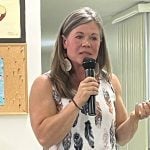BARCELONA, Spain (Thomson Reuters Foundation) — Archer Daniels Midland has agreed to stop deforestation that is caused by soybean and palm oil production in its global supply chains.
The company, which is one of the world’s largest soybean traders and a top soybean exporter in Latin America, joins a growing group of multinational firms that are taking action to ensure their businesses do not destroy forests.
New commitments from companies related to reducing deforestation jumped 80 percent in 2013-14, meaning more companies are taking the problem seriously, according to a recent report from Forest Trends, a Washington-based non-governmental organization.
Read Also

Alberta may eliminate marked fuel
Alberta may soon stop selling dyed gasoline and diesel.
ADM’s move came in response to pressure by shareholders Green Century Capital Management, which manages fossil fuel-free mutual funds, and the New York State Common Retirement Fund. They have now withdrawn a proposal outlining the investment risks associated with deforestation.
“ADM’s commitment to using only sustainably sourced palm and soy products validates our message that strong environmental policies make economic sense,” said New York state comptroller Thomas P. DiNapoli.
“Business practices that destroy the environment and foster climate change can not only harm the public but can damage corporations’ reputations, their bottom line and their investors,” he added.
Almost 150 million acres of tropical forest have been converted to agriculture since 2000, according to Forest Trends.
Agriculture is widely recognized as the largest driver of global deforestation and is linked to 80 percent of forest loss around the world, the Overseas Development Institute said in a new report.
The report argues that government subsidies for agricultural commodities are undermining international aid to protect forests and should be reformed.
“While international forest aid seeks to promote private investment in forest protection, governments around the globe are incentivizing commodities that drive deforestation,” said Will McFarland, the report’s co-author.
In Brazil and Indonesia, where more than half the world’s deforestation occurs, an average of $41 billion in domestic public finance has been spent annually subsidizing some of the leading causes of that forest loss, the institute said. That’s 127 times what the two countries received in annual forest aid.
The researchers identified 48 domestic subsidies to support Indonesia’s palm oil and timber industries and Brazil’s beef and soy sectors.
As well, the study said agreements to prevent the cultivation of a crop causing deforestation may not work.
For example, a private-sector led moratorium was started in Brazil in 2006. Groups representing 90 percent of the soy market committed not to buy soy grown on land cleared of trees in the Amazon rainforest.
However, soy is still linked to deforestation because cattle pastures have been converted to grow the crop, which displaces beef production to areas where forest loss is occurring, the report said.
ADM, which buys soybeans but does not grow them, plans to launch a Responsible Soy Standard in Brazil on a pilot basis. Growers will be assessed on their adherence to standards covering labour practices, water and soil use and observance of land rights.
The institute said international aid should be used to reform subsidies in a way that safeguards forests as well as livelihoods and food security.
“Through subsidy reform, modest sums of forest finance can be used to ensure any subsidies are provided in a manner that both protects forests and the poor,” McFarland said.














